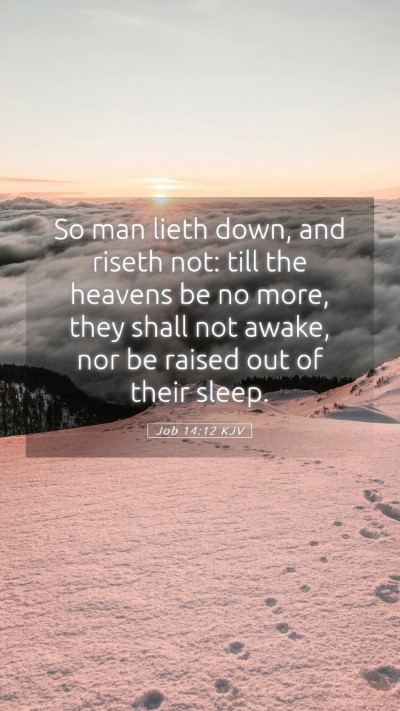Old Testament
Genesis Exodus Leviticus Numbers Deuteronomy Joshua Judges Ruth 1 Samuel 2 Samuel 1 Kings 2 Kings 1 Chronicles 2 Chronicles Ezra Nehemiah Esther Job Psalms Proverbs Ecclesiastes Song of Solomon Isaiah Jeremiah Lamentations Ezekiel Daniel Hosea Joel Amos Obadiah Jonah Micah Nahum Habakkuk Zephaniah Haggai Zechariah MalachiJob 14:12 Meaning
What is the meaning of Job 14:12?
So man lieth down, and riseth not: till the heavens be no more, they shall not awake, nor be raised out of their sleep.
Job 14:12 Bible Verse Meaning
Understanding Job 14:12 - Bible Verse Commentary and Analysis
Job 14:12 reads, "So man lies down and rises not: till the heavens be no more, they shall not awake, nor be raised out of their sleep." This profound verse captures the essence of human mortality and serves as a poignant reflection on life, death, and the hope of resurrection. In this commentary, we will delve into the meaning of this Bible verse, and explore its interpretations through the insights of public domain commentaries by Matthew Henry, Albert Barnes, and Adam Clarke.
Verse Context and Overview
The Book of Job is often regarded as one of the most profound pieces of literature in the Bible, addressing the themes of suffering, justice, and the nature of God. In Job 14, the speaker, Job, laments the brevity of human life and the inevitability of death, contemplating the finality of death and what lies beyond. This verse is particularly striking in its vivid imagery of sleep and awakening, which encourages a deeper Bible verse understanding.
The Meaning of Job 14:12
-
Matthew Henry's Commentary:
Henry interprets this verse as a solemn acknowledgment of the finality of death. He emphasizes that just as one who sleeps does not awake until a new day dawns, so too does man lie down in death, awaiting the day of resurrection. This highlights the reality of death as an unchangeable part of human existence and serves to underline the need for a hope that transcends death.
-
Albert Barnes' Insights:
Barnes elaborates on the imagery of sleep, framing it as a metaphor for death. He suggests that Job is expressing a deep sense of despair over life's fleeting nature. According to Barnes, Job's statement reflects his understanding that once deceased, a person remains “asleep” until a transformative event occurs—this alludes to the resurrection, where those who have died will awaken once more.
-
Adam Clarke's Perspective:
Clarke points out that this verse encapsulates Job's struggle with grief and his quest for hope. He argues that the phrase about not arising until the heavens are no more implies a long period of awaiting, possibly referencing God’s ultimate plan for restoration. Clarke further suggests that Job’s wording captures the tension between despair and the faint light of hope in the resurrection and eternal life.
Theological Implications
Job 14:12 invites readers to reflect on several significant theological implications regarding life, death, and resurrection. Understanding this verse can aid in Bible study groups or online Bible study sessions as it opens avenues for discussion regarding the afterlife and the nature of human existence.
-
Human Mortality:
The verse starkly illustrates human mortality, reminding believers of the transient nature of life. In the face of suffering and loss, it's an invitation to seek comfort in faith and the promises of God.
-
Hope of Resurrection:
Job's reflection on sleep conveys the anticipation of awakening, symbolizing the hope of resurrection—a theme prevalent throughout the Scriptures. This hope reassures believers of life beyond physical death and the restoration of all things.
-
God's Sovereignty:
The verse presents a profound insight on divine sovereignty, suggesting that life and death are within God’s control. Embracing this truth can bring peace and understanding during trials.
Applications for Daily Life
Applying the lessons from Job 14:12 to daily life involves recognizing the value of time and the importance of spiritual readiness for the inevitable. Believers are encouraged to contemplate their own lives and the legacy they leave behind.
-
Encouragement in Suffering:
For those experiencing pain or loss, this verse serves as a soothing reminder that death is not the end, but rather a transition to a new state of existence.
-
Legacy of Faith:
The verse prompts reflection on one’s life choices and the impact of faith. It encourages believers to live purposefully, aiming to cultivate a deep relationship with God.
-
Discussion Topics:
This verse can initiate conversations in Bible study lessons, discussing the significance of suffering, the nature of hope, and interpretations of resurrection in both the Old and New Testaments.
Cross References
- Psalm 90:5-6 – Discusses the brevity of life.
- 1 Thessalonians 4:13-14 – Assures believers regarding those who have died.
- John 11:11-14 – Jesus refers to death as sleep when discussing Lazarus.
Conclusion
In summary, Job 14:12 reflects profound truths about life, death, and the hope of resurrection. By understanding this verse through the insights of various commentaries, believers can gain valuable Bible study insights and approach the topic of mortality with a deeper, more meaningful perspective. This process of biblical exegesis allows us to appreciate the complexities within Scripture and apply its teachings to our lives today.


